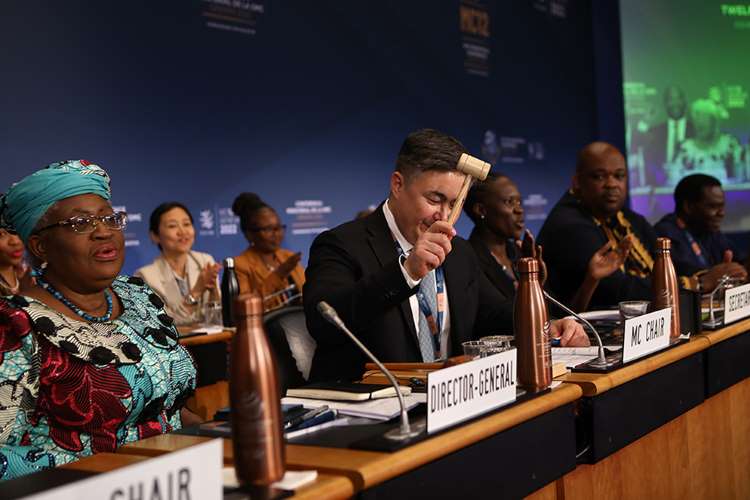
The twelfth WTO Ministerial Conference (MC12 of the World Trade Organisation ) took place June 12-17 in Geneva, Switzerland. The negotiations were a reminder that despite India’s recent pursuit of bilateral trade deals and interest in the new Indo-Pacific Economic Framework (IPEF) floated by American President Joseph Biden, India is a singularly difficult negotiating partner on trade. India’s growing economic heft, domestic political compulsions, and internal growth challenges present challenges to India’s partners. But, in the end, a good package came together. Like a Rorschach test, India’s partners will each learn different lessons from this experience.

WTO ministerial meetings get a bit less attention today than in the past. The proliferation of bilateral and multilateral deals, the Trump Administration’s disregard for WTO processes, paired with the failure of recent ambitious trade liberalisation packages at the WTO have shifted attention elsewhere. However, the WTO remains a key forum for resolving disputes and can still serve as a platform for negotiating important new trade commitments if major economies “buy in.”
Key global issues shaped the agenda for the June ministerial. These include the ongoing Covid pandemic, which had already caused the ministerial to be delayed twice, as well as food insecurity triggered by Russia’s invasion of Ukraine this spring. Additional elements have been under discussion for decades or are already in-force and required renewal.
READ I Global recession fears intensify after US Fed’s bold rate hike
WTO Ministerial outcomes
India’s Minister of Commerce & Industry, Piyush Goyal, took the spotlight as he raised concerns about the WTO’s agenda. Other nations’ negotiating teams publicly and privately voiced frustration over India’s disinterest in talks, instead preferring to issue strongly-worded public statements attacking the agenda. The ministerial had to be extended by a day as negotiators attempted to finalize agreement on key agenda items.
Despite the thunder and lightning, the ministerial did end up finalising critical agreements. Included in this list:
- World Food Program Export Prohibition Exemption (W18): WTO members pledged not to place export prohibitions or restrictions on World Food Program purchases for non-commercial humanitarian aid.
- TRIPS Agreement – Covid Vaccines (W15/R2): Relaxed intellectual property restrictions related to a nation’s right to have local firms produce Covid vaccines.
- Continuation of the e-commerce taxation moratorium (W23): Continued the 1998 moratorium on the taxation of cross-border electronic commerce until the end of 2023.
- New limits on members’ subsidies on fisheries (W22): Put in place new commitments for WTO members related to subsidies on fisheries that contribute to illegal fishing, overfishing, and other ecological harms.
This is a pretty concrete list of outcomes with significant impacts on the rules of international commerce. Such a robust level of action could be a much-needed shot in the arm when looking at aspirational ideas for future ministerial dialogues. Despite many earlier reports of the impending death of the WTO, the organisation continues to adapt and move ahead.
However, the ministerial also renews lingering concerns about India’s interest in being a part of global trading regimes. India has been signing bilateral trade deals, but these are fairly narrow agreements. These agreements push goods trade liberalisation, but are underwhelming in other areas of commercial deregulation such as services liberalisation, national treatment, and investor protections.
Washington’s many India skeptics were warmly surprised when India was announced as an initial partner in the Biden Administration’s Indo-Pacific Economic Framework (IPEF). While IPEF does not yet have concrete commitments, the fact that India wanted to join at the ground floor generated real enthusiasm.
This enthusiasm was dulled somewhat by what transpired in Geneva. Yes, concrete steps were achieved. But the torturous process to get these modest steps codified triggered painful recollections of working with India at multilateral forums in the past. Perhaps the barely-disguised security concerns behind the IPEF workstreams will build a different type of momentum. But if early IPEF talks look anything like what transpired in Geneva, this may end up being a contentious process.
For now, we should focus on the positive outcomes from the WTO ministerial. Despite India’s tough opening position, we did come to consensus on key agreements. It took a bit more work than we might have liked, but the outcome is the most important thing. Let us hope this is the main take-away from various trade partners. In this way, India’s partners at future WTO ministerial meetings and commercial negotiations in other venues like IPEF will not limit aspirations.
Richard Rossow is a leading expert in US-India commercial ties. He leads the India program at the Center for Strategic & International Studies, and the India advisory team at McLarty Associates.

